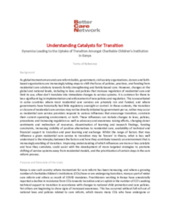
Understanding Catalysts for Transition
Dynamics Leading to the Uptake of Transition Amongst Charitable Children’s Institution in Kenya
Terms of Reference
Background:
As global momentum around care reform builds, government, civil society organizations, donors and faith-based organizations are increasingly taking steps to shift the focus of policies, practices, and funding from residential care solutions towards family strengthening and family-based care. However, changes at the global and national levels, including to laws and policies that increase regulation of residential care and limit its use, often don’t translate into immediate changes to service systems. It is common for there to be a significant lag in implementation and enforcement of new policies and regulation. This is exacerbated in some countries where most residential care services are privately run and funded, and where governments have historically had little regulatory oversight or control. In these contexts, the transition or closure of residential care services may not be directly initiated by government per se, rather may occur as residential care service providers respond to various influences that encourage transition, constrain their current operating environment, or both. These influences can include changes to laws, policies, procedures and increasing regulation as well as advocacy and awareness raising efforts, changing donor sentiments and redirection of resources, dissemination of learning and research findings, funding constraints, increasing visibility of positive alternatives to residential care, availability of technical and financial support to transition and peer learning and exchange. Whilst the range of factors that may influence a given residential care service to transition may be ‘known’ in theory, what is less well understood is the interplay between the factors and how they contribute towards an environment that is increasingly enabling of transition. Improving understanding of which influences are more or less catalytic and how they cumulate, could assist with the development of more targeted strategies to promote shifting of service systems away from residential models, and the prioritization of certain steps in the care reform process.
Purpose and rationale of the study:
Kenya is one such country where momentum for care reform has been increasing, and where a growing number of charitable children’s institutions (CCIs) have or are undergoing transition; many as part of wider care reform and others as result of COVID mandates. Practitioners working in Kenya have anecdotally reported a decline in resistance from CCIs towards transition and an uptick in the number of CCI’s seeking technical support to transition in accordance with changes to national child protection and care policies. Yet others are beginning to show signs of increased awareness. This has occurred without full roll out of national laws and policies related to care reform, which means many CCIs who have undergone or commenced transition have largely done so voluntarily and in the absence of a specific government directive mandating their closure.
Efforts to reform the care system in Kenya have included a combination of top-down government led strategies, such as the recently endorsed National Care Reform Strategy, donor engagement strategies and resourcing, and direct engagement and awareness raising amongst CCIs, including those run by faith-based groups and religious denominations. Peer exchange and outreach has also increased in Kenya with directors and staff of organizations who formerly ran CCIs now providing support to other CCIs to undergo transition. The range of strategies that have been employed to encourage transition make Kenya an ideal environment to study the interplay of top down, bottom up and horizontal influences and strategies, and examine which ones or combinations, are having the greatest influence on CCI’s decision to transition.
The purpose of this study is therefore to better understand these influences from the perspective of CCI directors and decision makers, what influences and what creates an enabling environment and what, if any, implications these findings have for local, national, and global care reform strategies and approaches.
Scope of the study:
This study is designed to be a small insights based qualitative study comprising semi structured in-depth interviews with approximately 25 CCI directors from Kenya. The interviews will seek to identify and explore the range of factors that led to the decision by the CCI directors/boards to undergo transition and the interplay between factors. An interview guide will be developed to guide interviews and ensure consistency. Participation from care leavers will be sought for the development of the tools. Interviewees will be identified in partnership with CTWWC and other partners/members of the Transitioning Working Group with Kenyan based transition projects. Interviews will be conducted in-person or over zoom by the in-country consultant.
A findings report will be produced, highlighting the key themes emerging from the interviews. In addition, a set of short illustrative case studies taken from the interviews will be developed. The anticipated audience for these resources includes policy makers, practitioners supporting transition and organizations involved in supporting or developing country level care reform strategies.
Scope of work for the consultancy:
The consultant will be the primary person responsible for the implementation of the research project. The scope of work for the consultant includes the following:
- Co-developing the interview tools with BCN and CTWWC
- Liaising and scheduling interviews with identified participants
- Conducting recorded interviews in 25 CCI directors
- Transcription (via software)
- Coding and analysis of data
- Writing the findings report
- Writing a series of short case studies
- Incorporating feedback provided by the reference group into the final report
The consultant will be required to liaise with BCN and CTWWC, however will be responsible to the BCN Senior Technical Advisor.
The total length of the consultancy is 20 days.
Deliverables:
- 1 x findings report (25–35-page report)
- 3 x case studies (max 3-4 pages in length each)
- Interview transcripts
- Participant consent forms
Timeline:
The project will be undertaken between March - August 2022
Required competencies:
The in-country consultant should meet the following criteria in terms of skills and experience:
- Excellent research skills and experience with qualitative research, including conducting semi structured interviews
- Strong experience in leading research projects of a similar nature, including managing research logistics and report writing
- Master’s degree in a related field, with a proven consultancy experience
How to apply::
Interested consultants who meet the criteria should submit a detailed CV, accompanying letter of interest and an example of research produced to:
Rebecca Nhep
Senior Technical Advisor
Better Care Network
Rebecca.nhep@bettercarenetwork.org

